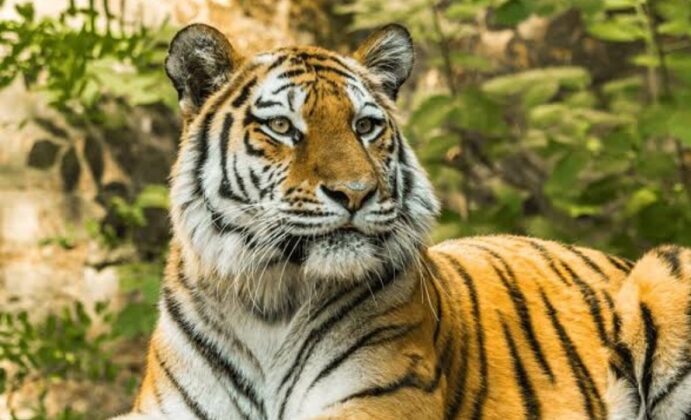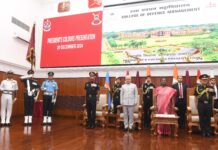By Our Correspondent
NEW DELHI/BHUBANESWAR: The Union Cabinet chaired by Prime Minister Shri Narendra Modi approved the establishment of International Big Cat Alliance (IBCA) with headquarters in India with a one-time budgetary support of Rs.150 crore for a period of five years from 2023-24 to 2027-28.
Acknowledging India’s leading role in conserving tigers, other big cats and many of its endangered species, the Prime Minister of India during his speech on the occasion of Global Tiger Day, 2019 called for an Alliance of Global Leaders to curb poaching in Asia. He reiterated this on the occasion of Commemorating 50 years of India’s Project Tiger on April 9, 2023 and formally announced launch of an International Big Cat Alliance aiming at securing the future of big cats and landscapes they thrive. The pioneering and long standing tiger and other big cat conservation good practices evolved in India may-be replicated in many other range countries.
Seven big cats include Tiger, Lion, Leopard, Snow Leopard, Puma, Jaguar and the Cheetah out of these five big cats viz. Tiger, Lion, Leopard, Snow Leopard and Cheetah are found in India.
The International Big Cat Alliance has been conceived as a multi-country, multi-agency coalition of 96 big cat range countries, non-range countries interested in big cat conservation, conservation partners and scientific organizations working in the field of big cat conservation besides business groups and corporates willing to contribute to the cause of big cats, to establish networks and develop synergies in a focused manner so as to bring to a common platform a centralized repository of successful practices and personnel, backed by financial support which can be leveraged to strengthen the conservation agenda in the field to arrest decline in big cat population and reverse the trend. This will be a demonstrative step in leadership position on big cat agenda, to bring range countries and others on a common platform.
IBCA aims for mutual cooperation among countries for mutual benefit in furthering the conservation agenda. IBCA would have a multipronged approach in broad basing and establishing linkages manifold in several areas and help in knowledge sharing, capacity building, networking, advocacy, finance and resources support, research and technical support, education and awareness. With big cats as mascots for sustainable development and livelihood security, India and the big cat range countries can usher in major efforts on environmental resilience and climate change mitigation, while paving a future where natural ecosystems continue to thrive, and gain centrality in economic and development policies.
IBCA envisages synergy through a collaborative platform for increased dissemination of gold standard big cat conservation practices, provides access to a central common repository of technical know-how and corpus of funds, strengthens the existing species-specific intergovernmental platforms, networks and transnational initiatives on conservation and protection and assists securing our ecological future and mitigate adverse effects of climate change.
The framework of IBCA would have a multipronged approach in broad basing and establishing linkages manifold in several areas and help in knowledge sharing, capacity building, networking, advocacy, finance and resources support, research and technical support, insurance against failures, education and awareness. Brand ambassadors across range countries would play a greater role in carrying forward the concept and will boost the impetus to ensure Big Cat Conservation-campaign amongst the masses including the youth and local communities who are important stakeholders in the whole process. Country’s climate leadership role through a collaborative action oriented approach and initiatives, leading to enhanced green economy projects is possible through IBCA platform. Thus, the impetus across Big Cat alliance members could change the face of conservation and prosperity of enabling partners.
The International Big Cat Alliance recognizes the importance of integrating biodiversity policies with sustainable development goals (SDGs) to achieve holistic and inclusive conservation outcomes. The aforementioned advocates for policy initiatives that align biodiversity conservation efforts with local needs and contribute towards the attainment of UN SDGs within IBCA member countries. Mainstreaming Biodiversity across Sectors to embrace integrating biodiversity considerations into sectoral policies and development planning processes; including agriculture, forestry, tourism, and infrastructure development; promoting sustainable land-use practices, habitat restoration initiatives, and ecosystem-based approaches that support biodiversity conservation and contribute to SDGs related to climate change, food security, clean water, and poverty reduction.
IBCA governance consists of Assembly of Members, Standing Committee and a Secretariat with its Head Quarter in India. Framework of Agreement (statute) has been drafted largely on the pattern of International Solar Alliance (ISA) and to be finalized by International Steering Committee (ISC). Host Country Agreement prepared on the lines of ISA and Government of India. Steering Committee will be constituted with nominated national focal points of founding member countries. Appointment of DG by MoEFCC as Interim Head of IBCA Secretariat till IBCA appoints its own DG during Assembly meeting. IBCA Assembly at Ministerial level to be chaired by President, HMEFCC, Gol.
IBCA has secured Government of India’s initial support of Rs. 150 crore for five years (2023-24 to 2027-28). For augmented corpus, contributions from bilateral and multilateral agencies; other appropriate institutions and mobilizing financial support from public sector organizations, national and international financial institutions and donor agencies will further be explored.






























